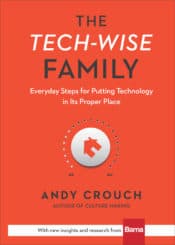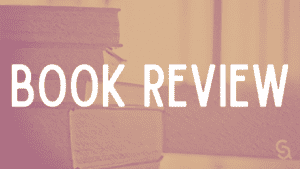
In The Tech-Wise Family, Andy Crouch offers a vision of the good life—a world in which individuals, families, and communities flourish by living according to God’s order. When we are living well, our lives are full of rich relationships, we acquire skill and mastery in our work, and we cultivate awe for the created world. However, according to Crouch, this life is threatened when technology invades every aspect of our lives. Crouch argues that in order to live well, we must put technology in its proper place to make space for the cultivation of virtue.
(I should note, in the spirit of full disclosure, that I am probably not the intended audience for this book. This is a book for families who seek to limit the presence of technology in their lives. In contrast, I’m the only adult I know who does not have a smartphone.)
According to Crouch, technology inhibits our proper development. He writes, “For technology, with all its gifts, poses one of the greatest threats ever conceived by human society to the formation of wise, courageous persons that real family and real community are all about.” Crouch has something very specific in mind when he uses the term “technology,” as he makes a distinction between technology and tools.
Tools help or enhance our work. For example, a violin is a tool. People could make music without instruments, but a violin can enhance the music we are already making. To play the violin well requires years of practice, discipline, and sacrifice. Mastery will produce beauty, as well as personal and communal gratification. The work is hard, but the fruit is good. By contrast, recorded music is technology. We simply tell Siri to play a song, and there it is. Technology does not aid us in our work. It does the work for us. Technology is easy, and it requires nothing of us. We are created to be active producers, but technology seductively reduces us into passive consumers. God designed us to cultivate skills and be creative. Technology potentially robs us of an essential aspect of our humanity.
Technology does not aid us in our work. It does the work for us. Technology is easy, and it requires nothing of us.
Our technological devices are also distinct from tools in other fundamental ways. Tools have a place. For example, the lawnmower stays in the garage. However, our computers and smartphones are ubiquitous. They follow us everywhere. We go to sleep as we check our phones, and they wake us up in the morning. Our home should be the place where we engage in conversation, love, and building our relationships. Technology invades our homes. We are tempted to focus on our glowing rectangles and neglect the people around us. Technology stifles relationships. When our relationships diminish, so does our humanity.
Families and communities are for forming persons who pursue courage and wisdom, according to Crouch. We can only become wise and courageous when we live in well-ordered families and communities. In close relationships, our pretense of wisdom is shattered. Family and friends see our foolishness, forgive us, and love us. Through this process, we become wise. To act wisely is often difficult. To become courageous, we need to be surrounded by people who know us and the challenges of our circumstances and encourage us to act in spite of all the obstacles and dangers. Relationships continually shape us into well-ordered, wise, and courageous persons. We cannot develop properly in the absence of robust relationships.
Crouch asserts that the invasion of technology into our lives and homes perverts the God-ordained rhythms of work and rest: we work for six days and rest on the seventh. Technology has transformed work into toil and rest into leisure. By design, we are gratified when we work. We yearn to master a craft and make something of beauty or something that will be useful to others. Then, we are commanded to enter into a Sabbath rest, which is not passivity and lethargy but the active and intentional restoration of all that is good. However, work can become toil when the labor is useless and endless. Crouch argues that technology, in a variety of ways, turns work into toil, in part because technology allows our toil to follow us home. To escape our technology-induced toil, we do not enter into the proper Sabbath rest but escape into leisure.
Leisure is the fruitless escape from toil, and paying others to entertain us. Or, to put it another way: we veg out on the couch while binge-watching Netflix on a tablet because we are too exhausted to do anything better. Movies are perfectly calibrated to stimulate all our senses effortlessly. After a steady diet of a digitized world, our senses are so dulled that we are incapable of appreciating the real world of God’s creation. Technology seductively offers a substitute for the good life God intends. It is easy and tantalizing. But, it will inevitably leave our souls sick and malnourished.
After a steady diet of a digitized world, our senses are so dulled that we are incapable of appreciating the real world of God’s creation.
Crouch’s argument is persuasive. And as he points out, our world is changing rapidly. The world has radically altered in the past thirty years. Our children are growing up in a world that barely resembles the one we knew. They are the first generation raised in a society where digital devices and the internet are ubiquitous. Can they fathom a world where they can’t get an answer from Siri? Their young souls are being shaped by smartphones and social media, and we don’t know how they are going to turn out. Initial reports are not altogether good. Increased adolescent anxiety and depression in all likelihood are linked to the use of social media, although others argue that the link is not as straightforward as it might seem. Even without empirical studies, though, most of us intuitively know that there is something wrong when our families sit at the dinner table and everyone is staring at their illuminated devices and barely talking to one another. (This presumes, of course, that all the members of the family are at the dinner table in the first place.)
However, The Tech-Wise Family is not ritual self-flagellation. Parents may feel powerless in the face of an overpowering world of technology. Crouch not only offers hope and a vision of a better life, but practical suggestions in every chapter. Crouch is realistic. Technology is not going away, and he is not suggesting that we eliminate our devices from our lives. However, we can put technology in its proper place to protect and prioritize our humanity and families.
I particularly appreciated this suggestion that we put technology in its proper place—literally. Crouch describes the way his family organizes the heart of his home. Phones and computers are pushed to the periphery. Musical instruments are accessible. Original works of art are on the wall. The home is organized in such a way that encourages conversation and creativity. The Crouch family does not reject technology. They protect what is important.
Dr. Michael Lee is the Grace F. Kea Associate Professor of American History at Eastern University. Michael is an intellectual historian, with a particular focus on the development of religion and theology in Europe and America during the early modern era, and the author of The Erosion of Biblical Certainty: Battles over Authority and Interpretation in America. He is currently working on a book on the history of theodicy (or the history of the problem of evil). When he is not at work or spending time with this family, he likes to bicycle through the wooded trails and roads of Pennsylvania.

